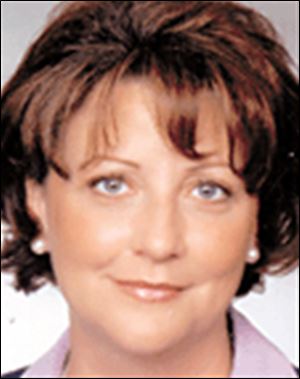
Thurber proposes sales tax cut
7/6/2004

Maggie Thurber
At the same time the Lucas County commissioners are staring down a $7 million budget deficit next year, Maggie Thurber is talking tax cuts.
Ms. Thurber, a commissioner, said the projected deficit will make a cut in the county sales tax impossible for 2005, but she's asked the county's budget office to examine if one could be implemented in three to five years.
She proposes cutting the county's piggyback sales tax from 1.25 percent to 1 percent. That would leave the county with $13.4 million less to work with than it already has in its $132 million general fund budget.
"I think it is absolutely possible," Ms. Thurber said. "If we sat down and told all the county elected officials that over the next three years we're going to try to cut county government so we can cut our sales tax, I think we could do that."
Cutting the sales tax by 0.25 percent would allow taxpayers to save $50 on a $20,000 car or $2.50 on a $1,000 refrigerator.
But both of Ms. Thurber's fellow commissioners don't agree with her budget assessment.

Harry Barlos, president of the board of commissioners, dismissed the idea of a sales tax reduction as not fiscally prudent. He said he's had a hard enough time selling elected officials on the idea that their budgets aren't going to grow again next year.
"At this point, any discussion of lowering taxes is totally premature. The new General Assembly that will take office Jan. 1 is facing a nearly $4 billion deficit," Mr. Barlos said. "If it trickles down to county government, that could represent substantial reductions of revenue to the 88 counties in Ohio."
Commissioner Tina Skeldon Wozniak also reacted with skepticism. She voted against the 2004 budget because she didn't think it provided enough money for the sheriff and prosecutor's offices. She said she doesn't understand how the county could meet its obligations with substantially less money.
"I'd like to hear how she can maintain quality services with that decision," Ms. Wozniak said. "She knows the prosecutor is trying to maintain safety with a limited number of prosecutors and that the sheriff's ability to maintain road patrols is getting slimmer and slimmer."
Ms. Thurber, the board's lone Republican, said that considering a tax cut might reveal opportunities to save. She said it would require making tough decisions about programs that aren't mandated by state law. Elected officials, she said, would have to trim their budgets and focus on necessities.
"We have all these pockets of people that say the world will cave in if we don't fund that particular item," Ms. Thurber said.
The state sales tax is 6 percent. The county adds 1.25 percent onto that to pay for things like the jail, prosecutor's office, and emergency medical services.
The sales tax is the most volatile portion of the county's revenue stream because it fluctuates with the economy. This year, it's estimated that it will bring in $67.3 million for the general fund.
The county increased its piggyback sales tax from 1 percent to 1.25 percent in 1993 to pay for emergency medical services and other public safety issues. About $9 million goes toward the funding of the 10-county Emergency Medical System ambulances.
The $4.4 million that's left over has been used to pay for things such as the salaries of sheriff's deputies, court security, and a courthouse computer system, according to the county's budget office.
Sheriff James Telb, a Democrat, said he fears that a tax cut would jeopardize funding of the emergency medical services.
"I was there when they increased the sales tax," he said. "I did quite a bit of work to get it passed because it was to fund our emergency medical system. So if they would cut that tax back, those agencies that benefit from it would be the hardest hit. I don't think this is the time to be cutting back on that."
Cutting the sales tax would be relatively novel, according to Larry Long, executive director of the County Commissioners Association of Ohio. He said cuts usually happen only when an increase is instituted with an automatic-termination provision.
Mr. Long said many commissioners around Ohio are watching closely what the state legislature is going to do with the budget in the next year. A temporary sales tax increase from 5 percent to 6 percent is scheduled to expire in mid-2005.
It is expected to generate $1.3 billion in the next fiscal year, which is just about the amount the state sends to various branches of local government. Lucas County is expected to receive about $8.1 million this year from the local government fund.
Mr. Long said the concern is that the local government funds that go to cities, counties, townships, and libraries could be slashed by the state to make up for the expiring sales tax increase.
"That's what we're real scared about," he said. "It's hard to balance the [state] budget, and those figures come so close to being the same."
Contact Dale Emch at:
daleemch@theblade.com
or 419 724-6061.